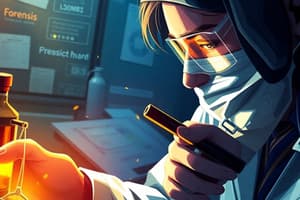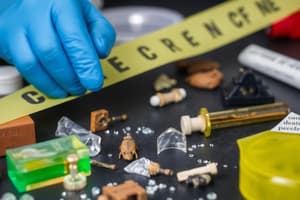Podcast
Questions and Answers
What is the primary focus of forensic science?
What is the primary focus of forensic science?
- Identification of eyewitnesses
- Analysis of physical evidence (correct)
- Recreation of crime scenes
- Understanding criminal psychology
Which of the following best describes Modus Operandi?
Which of the following best describes Modus Operandi?
- The motives behind criminal activity
- The methods or patterns used by criminals (correct)
- The act of instigating a crime
- The sources of criminal evidence
What is the significance of Corpus Delecti in forensic science?
What is the significance of Corpus Delecti in forensic science?
- It defines the psychological profile of a suspect
- It refers to the body of evidence that a crime has occurred (correct)
- It denotes the legal jurisdiction of a crime
- It outlines the legal rights of the accused
Which organization is responsible for the central forensic laboratories in India?
Which organization is responsible for the central forensic laboratories in India?
Which of the following is a factor that can affect the collection of evidence?
Which of the following is a factor that can affect the collection of evidence?
Which of the following accurately describes a key principle of forensic science?
Which of the following accurately describes a key principle of forensic science?
Which of the following best illustrates the structure of forensic science laboratory divisions?
Which of the following best illustrates the structure of forensic science laboratory divisions?
What key aspect differentiates collectable evidence from mere observational findings in investigations?
What key aspect differentiates collectable evidence from mere observational findings in investigations?
Which of the following best describes the term 'modus operandi' within forensic science?
Which of the following best describes the term 'modus operandi' within forensic science?
In the context of forensic science, which of the following evidential types is categorized as objective evidence?
In the context of forensic science, which of the following evidential types is categorized as objective evidence?
Flashcards are hidden until you start studying
Study Notes
Definition of Forensic Science
- Forensic science is the application of scientific principles and techniques to investigate crimes and analyze evidence.
- It involves various disciplines such as biology, chemistry, physics, and more, to solve legal issues.
History of Forensic Science
- The origins date back to ancient civilizations where rudimentary methods were used to solve crimes.
- Significant developments occurred in the 19th century with advancements in fingerprinting, toxicology, and ballistics.
Pioneers of Forensic Science
- Hans Gross: Often called the father of criminalistics, he established principles for examining crime scenes.
- Alphonse Bertillon: Developed the Bertillon method of identifying individuals based on physical measurements.
- Edmond Locard: Known for Locard's Exchange Principle, stating that every contact leaves a trace.
Nature, Need, and Scope
- Forensic science is interdisciplinary, encompassing various scientific fields.
- It is essential for solving crimes, ensuring justice, and supporting law enforcement efforts.
- Its scope includes crime scene investigation, evidence analysis, and expert testimony in court.
Principles of Forensic Science
- Locard's Exchange Principle: Every criminal leaves something at the crime scene and takes something away.
- Chain of Custody: Maintaining the integrity of evidence from collection to presentation in court.
- Objectivity: Forensic analysis must be impartial, relying solely on scientific evidence.
Educational Setup of Forensics in India
- Forensic education is provided at various levels, including undergraduate and postgraduate courses.
- Institutions offer specialized programs in forensic science, criminology, and related fields.
- Emphasis on practical training in laboratories to enhance practical skills.
Central and State Laboratories of India
- Central Forensic Science Laboratory (CFSL): Operates under the Ministry of Home Affairs, providing specialized forensic services.
- State Forensic Science Laboratories: Each state maintains its own laboratory with responsibilities similar to CFSL, focusing on regional cases.
Divisions of Forensic Science Laboratory
- Divided into various specializations like forensic biology, forensic chemistry, toxicology, and fingerprint analysis.
- Each division focuses on specific types of evidence and analysis techniques.
Evidence
- Evidence is any information used to support or refute claims in a legal context.
- Types of evidence include physical, documentary, testimonial, and digital evidence.
Types of Evidence
- Physical Evidence: Tangible objects like weapons, clothing, or fingerprints.
- Testimonial Evidence: Statements made by witnesses.
- Documentary Evidence: Written or recorded material relevant to a case.
Crime Definition
- A crime is an act or the commission of an act that is forbidden or punishable by law.
- It encompasses various offenses against individuals, property, and public order.
Elements and Classifications of Crime
- Common elements include intent (mens rea), act (actus reus), and causation.
- Classifications include felonies, misdemeanors, and infractions based on severity.
Factors of Crime
- Factors influencing crime can include socio-economic status, environmental conditions, and psychological aspects.
Collection and Packaging of Evidences
- Proper collection techniques are crucial to maintain evidence integrity.
- Packaging must prevent contamination and damage, using specific materials tailored for different evidence types.
Modus Operandi
- Modus operandi refers to the patterns and methods used by a criminal in committing offenses.
- Understanding modus operandi aids in linking crimes and identifying suspects.
Corpus Delicti
- Corpus delicti is the body of the crime; it refers to the concrete evidence that a crime has occurred.
- Establishing corpus delicti is essential for validating a criminal prosecution.
Definition of Forensic Science
- Forensic science is the application of scientific principles and techniques to investigate crimes and analyze evidence.
- It involves various disciplines such as biology, chemistry, physics, and more, to solve legal issues.
History of Forensic Science
- The origins date back to ancient civilizations where rudimentary methods were used to solve crimes.
- Significant developments occurred in the 19th century with advancements in fingerprinting, toxicology, and ballistics.
Pioneers of Forensic Science
- Hans Gross: Often called the father of criminalistics, he established principles for examining crime scenes.
- Alphonse Bertillon: Developed the Bertillon method of identifying individuals based on physical measurements.
- Edmond Locard: Known for Locard's Exchange Principle, stating that every contact leaves a trace.
Nature, Need, and Scope
- Forensic science is interdisciplinary, encompassing various scientific fields.
- It is essential for solving crimes, ensuring justice, and supporting law enforcement efforts.
- Its scope includes crime scene investigation, evidence analysis, and expert testimony in court.
Principles of Forensic Science
- Locard's Exchange Principle: Every criminal leaves something at the crime scene and takes something away.
- Chain of Custody: Maintaining the integrity of evidence from collection to presentation in court.
- Objectivity: Forensic analysis must be impartial, relying solely on scientific evidence.
Educational Setup of Forensics in India
- Forensic education is provided at various levels, including undergraduate and postgraduate courses.
- Institutions offer specialized programs in forensic science, criminology, and related fields.
- Emphasis on practical training in laboratories to enhance practical skills.
Central and State Laboratories of India
- Central Forensic Science Laboratory (CFSL): Operates under the Ministry of Home Affairs, providing specialized forensic services.
- State Forensic Science Laboratories: Each state maintains its own laboratory with responsibilities similar to CFSL, focusing on regional cases.
Divisions of Forensic Science Laboratory
- Divided into various specializations like forensic biology, forensic chemistry, toxicology, and fingerprint analysis.
- Each division focuses on specific types of evidence and analysis techniques.
Evidence
- Evidence is any information used to support or refute claims in a legal context.
- Types of evidence include physical, documentary, testimonial, and digital evidence.
Types of Evidence
- Physical Evidence: Tangible objects like weapons, clothing, or fingerprints.
- Testimonial Evidence: Statements made by witnesses.
- Documentary Evidence: Written or recorded material relevant to a case.
Crime Definition
- A crime is an act or the commission of an act that is forbidden or punishable by law.
- It encompasses various offenses against individuals, property, and public order.
Elements and Classifications of Crime
- Common elements include intent (mens rea), act (actus reus), and causation.
- Classifications include felonies, misdemeanors, and infractions based on severity.
Factors of Crime
- Factors influencing crime can include socio-economic status, environmental conditions, and psychological aspects.
Collection and Packaging of Evidences
- Proper collection techniques are crucial to maintain evidence integrity.
- Packaging must prevent contamination and damage, using specific materials tailored for different evidence types.
Modus Operandi
- Modus operandi refers to the patterns and methods used by a criminal in committing offenses.
- Understanding modus operandi aids in linking crimes and identifying suspects.
Corpus Delicti
- Corpus delicti is the body of the crime; it refers to the concrete evidence that a crime has occurred.
- Establishing corpus delicti is essential for validating a criminal prosecution.
Studying That Suits You
Use AI to generate personalized quizzes and flashcards to suit your learning preferences.



